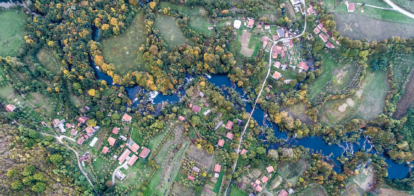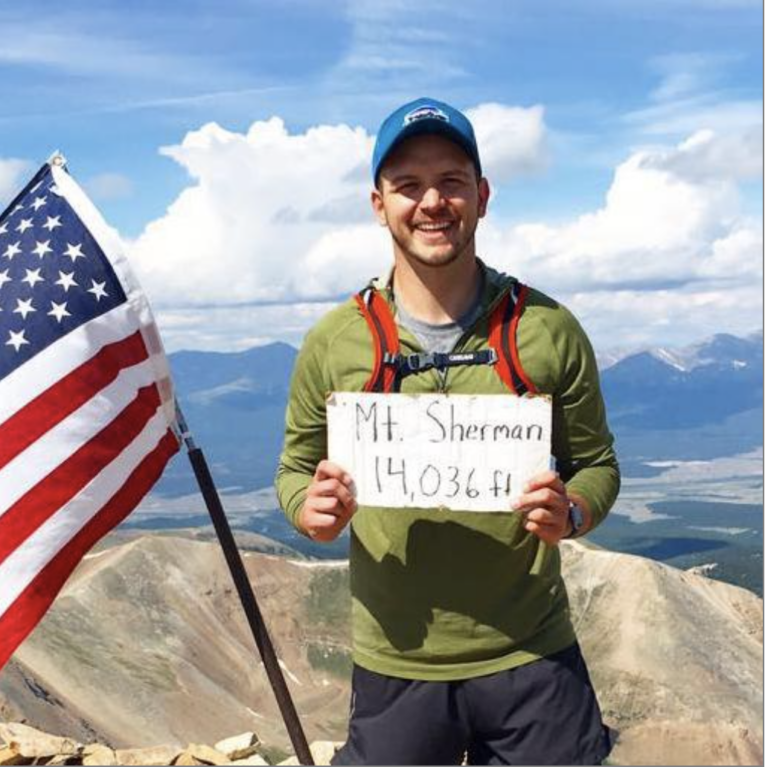Gdje Su Svi Dobrodošli (Where Everyone Is Welcome)
A Bosnian war refugee’s journey to a lifetime of community activism.
The day we left started like any other day.
My friends and I met at our teacher’s house and then walked to school together. It was May 15, 1994. We were 8 years old, and we played in the yard until the bell sounded, then lined up and waited for our teacher to call us inside. A few hours later, there was a knock at the classroom door. My mom walked in, and I knew something was wrong.
“Denis, you are leaving,” a classmate said after my mom and teacher stepped outside to talk. Everyone in the classroom was focused on me. I remember feeling panicked and excited at the same time because I didn’t know what “leaving” entailed. Weeks before, my family had packed bags in case we needed to leave at a moment’s notice.
Before the Bosnian War and genocide, my friends and I in Bosanski Novi, Bosnia and Herzegovina, picked wildflowers and played in the forest every spring. When the first snow fell, the entire city came out to ski and sled. My early summers were spent swimming in the Una and Sana rivers. Our lives centered around the Una; it’s where I learned to swim and where families gathered for picnics, sitting on the tufa stones that lined the banks.
When the war came, we ate our dinners on the floor to avoid being seen by snipers. Our garage became a refuge for our neighbors when it was not safe for them in their houses. It was cold and dark there, and I was instructed to stay in the corner and keep quiet. We heard gunfire and sirens. When grenades hit our local mosque, it felt like the whole world shook. I remember asking my grandfather if they were going to kill us, and he assured me that we were OK.
Eventually, our family had to hide, too. We spent several nights with relatives and friends because houses were being broken into and families separated or murdered. On other occasions, my grandparents sent my me and my mom to hide in the forest behind our house—a place that had once served as my playground turned into a place that protected me from evil. I was afraid to look in the rivers; it was common to see the dead from neighboring cities floating down the Sana.
My mom walked back in the classroom and motioned for me to come to her. She gave me a hug and whispered, “Say goodbye to your friends. We have to leave now.” I don’t remember much of our walk home or our conversation. I am sure she explained to me what was happening and what was expected of me. Our closest friends and family members were waiting for us at home, with tears in their eyes. I left that day with my grandparents, uncle and mom. Shortly afterwards, my town was ethnically cleansed of all Bosniaks. I have not been back since.
I remember a train ride, then eating cherries in a hotel room. My mom tells me I was so scared that day that my grandfather went out to grab me a snack to calm me down. Then, there was a cold bus ride to Croatia, organized by UNPROFOR (a UN peacekeeping force). At a checkpoint, the men and women were separated, and our bags were searched. Luckily, the authorities did not find a cassette of bedtime stories I’d packed. Cassettes were not allowed because they could be used to record events we’d witnessed. If they’d found it, I’d likely not be here to tell this story.
We spent the next few months in a refugee camp in Croatia where we shared a space with other families fleeing persecution. My mom and I had to stay longer than the others because of an issue with my passport, but we finally made our way to Bremen, Germany, where we lived on an army base with refugees from all over the world. We didn’t speak German, so we relied on our Bosnian community to get by.
In Germany, I was placed in a classroom with other refugees. Once I started learning to speak German, I was integrated into a German-speaking class, which made me nervous. Would kids make fun of me? Was I going to like my new teacher? “Dennis” was a popular name there, but my name stood out because it only had one n, and my last name was not easy to pronounce. Everyone called me “Denis Tu.” I didn’t mind it.
Part of our school’s curriculum was to go camping. We took a field trip to the forest every year where our teachers organized treasure hunts and encouraged us to explore. In fourth grade, we got to raise tadpoles in the pond behind the classroom and learn about the lifecycles of frogs. A class trip to the North Sea blew my mind—it was the first time I saw what low tide looked like. We explored the exposed seabed and learned about the animals hiding in the small pools. Each of these trips included lessons about the importance of protecting the environment.
Our visas expired when I was 10 years old, just when I was getting comfortable in Germany. My mom said we had an opportunity to live in the United States, a country I knew little about beyond what I’d seen on Beverly Hills 90210. With our belongings packed in white bags stenciled with blue letters, marked for IOM (International Organization for Migration), we traveled from Bremen to Frankfurt to New York to Chicago, where we settled—five of us in a one-bedroom apartment.
I was teased in my new school for not speaking English and that forced me to want to assimilate. I watched PBS shows and read the captions, determined to learn the language and lose my accent. This is the first time I recall wanting to forget my past and become American. I joined the Multicultural Youth Project at a local community center, an organization that gave refugees opportunities to share their experiences. Through this program, I was able to attend a leadership summit in Colorado—an expensive trip my family never would have been able to afford.
Seeing the Rocky Mountains for the first time and knowing that I was there thanks to the support of a community project set me on a course that would become my life’s work. I didn’t know what it looked like yet, but I knew I wanted to do something involving community activism and the outdoors.
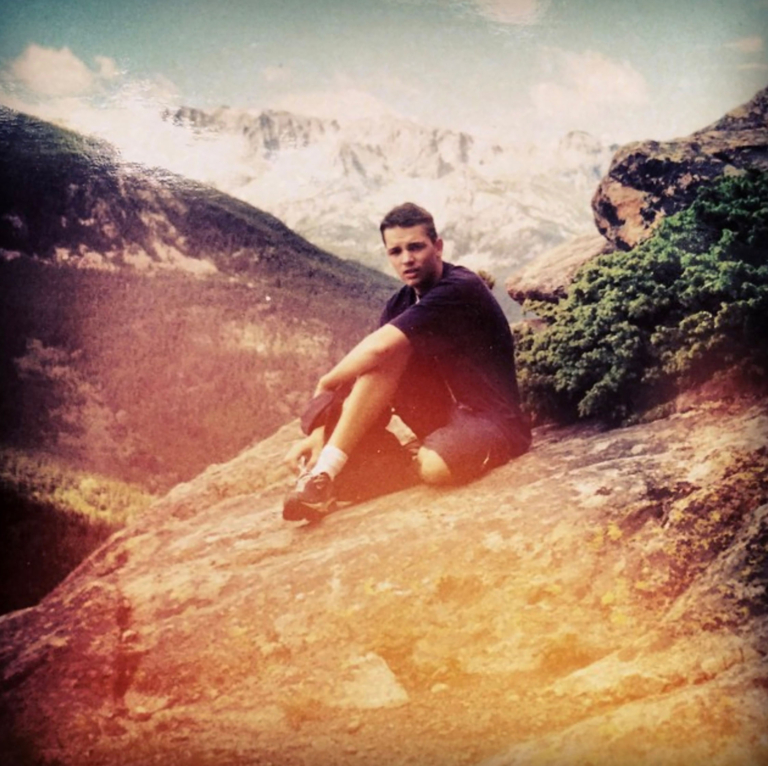
The author at 15 years old, in the Colorado Rockies. August, 2001. Community organizations gave Denis opportunities to learn about different cultures and connect with the outdoors. Photo courtesy of the Tuzinovic family
Going out of state for college was not an option for me because I couldn’t leave my mom alone after all that we’d gone through, and we were still adjusting to our life in the US. Throughout my 20s, I worked at a summer camp in Northern California helping kids connect with the outdoors and teaching them about sailing and camping. Each year it became a little harder to leave the wilderness and return to the concrete jungle of Chicago.
In 2016, when I was 30 years old, I followed my partner to Colorado and applied for a job with Patagonia Denver. I was nervous ahead of my interview; I wasn’t a climber and wasn’t sure how I’d be accepted or if I’d fit in. The whole team welcomed me from the start, and I realized that this was the place for me to dig in and start my career. I still keep in touch with my former managers and colleagues to this day.
Two years later, Patagonia launched the Blue Heart campaign to protect the free-flowing rivers in Bosnia and throughout the Balkan region. At the film premiere, I heard people on-screen speaking my native language and, for once, I didn’t have to read the subtitles. It was an important moment for me on multiple levels—not many people in the US knew about Bosnia and Herzegovina or the war. Most importantly, it brought back cherished memories of my home before the war, the Una river reminding me of happier times. If the river was destroyed, some of those memories would surely fade along with the river’s natural flow.
My journey as an activist continues today, and my work, play and activism are not separate from each other. As the environmental coordinator and retail floor leader at Patagonia Seattle, I work with local nonprofits to advance social and environmental justice. In my spare time, I volunteer with groups, including SR3 (a Seattle-based marine wildlife rehabilitation organization), the Winter Wildlands Alliance, the Raincoast Conservation Foundation and others.
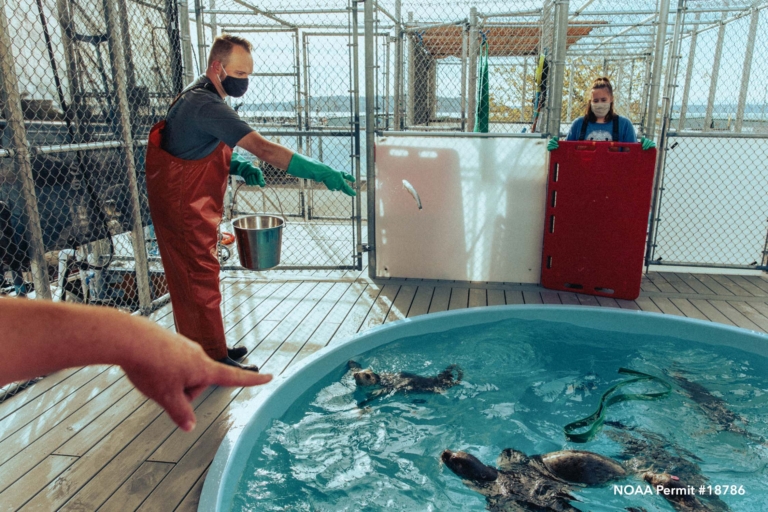
Fish of the day. Denis volunteering at SR3, the first marine wildlife rehabilitation hospital in the Pacific Northwest. Photo: Andrew Burton
In November 2020, I tore the right sleeve of my Patagonia Down Sweater. Through Patagonia’s Worn Wear program, I contacted our local repair business in Seattle to see if they could add Pride colors to the sleeve, as part of the repair. For years, I’d wanted to raise awareness around the LGBTQ+ community’s lack of representation in the outdoor community. We are rarely included in marketing, and it only seems like we are celebrated during Pride month, when every company changes their logo to celebrate the occasion—but come July 1, the logos revert to normal. It is my hope that the outdoor industry will become more inclusive and do a better job of establishing the outdoors as safe places where everyone feels welcome. How do we expect others to stand up for something when they have not been exposed to it?
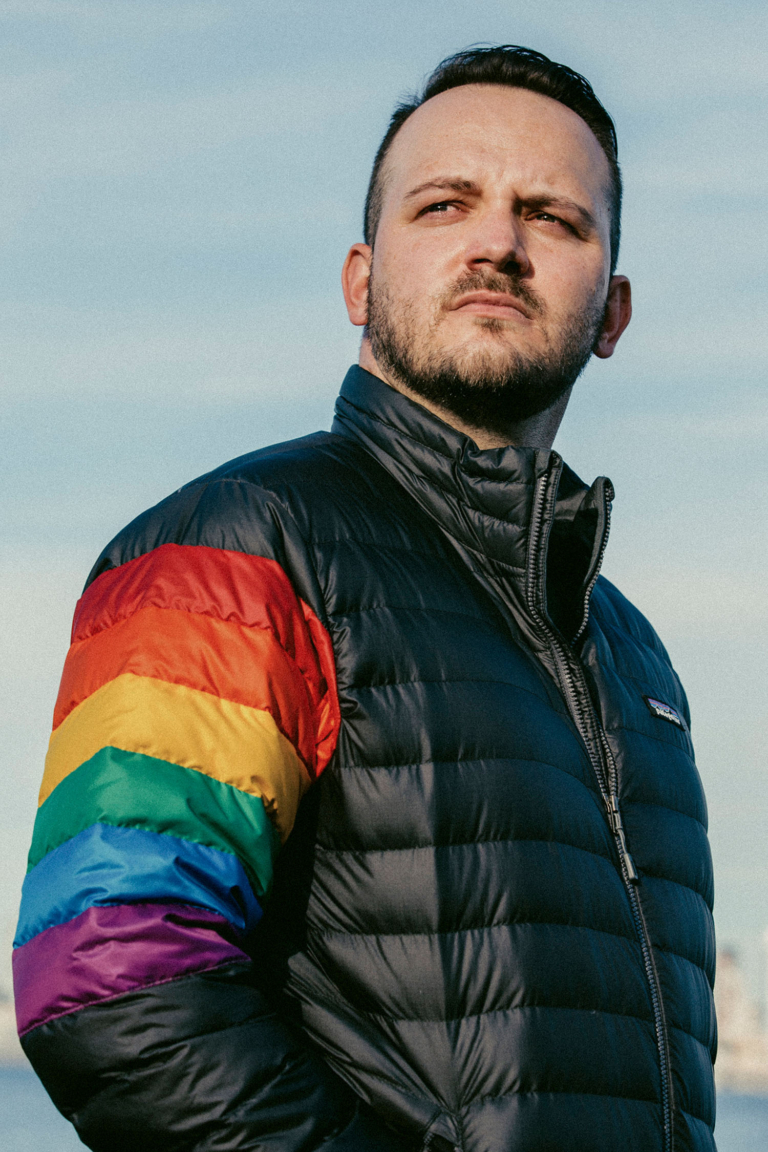
Denis has helped create nine Pride repairs, with more in the works. Photo: Andrew Burton
This jacket represents my life’s journey to becoming an activist. I like to think that each color tells a different part of my story, from surviving the war, to learning to coexist with different cultures, to finding my way in the outdoor community as a gay man. It’s also a conversation starter, a signal to queer people that we belong in these spaces, too. It’s a visible symbol of inclusivity, equality, acceptance, Pride—and my commitment to fight for environmental and human rights, forever.
